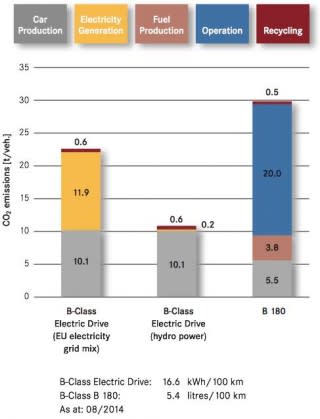Mercedes B-Class Electric Car Cuts Lifetime Carbon Emissions Up To 64 Percent
The environmental impact of plug-in electric cars continues to be the subject of significant discussion and debate among those less familiar with the technology and its impacts.
Virtually all studies conclude that they use less energy on a well-to-wheels basis than internal-combustion vehicles--especially when recharged from low-carbon or renewable sources.
DON'T MISS: 2014 Mercedes-Benz B-Class Electric Drive: First Drive
However, the environmental impact of manufacturing an electric vehicle appears to be higher--although exactly how much higher has been hotly debated since modern electric cars went on sale.

Now, Daimler has provided a lifecycle analysis of its Mercedes-Benz B-Class Electric Drive that shows it's genuinely greener than a gasoline car, including the impact of its manufacturing.
The analysis (PDF)--conducted by the Germany-based regulatory body TUV--shows that the electric B-Class cuts lifetime carbon emissions by 24 percent over a B 180 gasoline model when charged from a mix of power sources.
If it's charged exclusively with power from hydroelectric sources, its lifetime carbon is 64 percent lower than that of the four-cylinder gasoline model.
That analysis assumes the car is driven 160,000 kilometers (almost 100,000 miles) over its lifetime, and recycled at the end of its use.
ALSO SEE: Electric Car Life-Cycle Analysis: Renault Fluence ZE Vs Diesel, Gas Models

 Yahoo Autos
Yahoo Autos 
